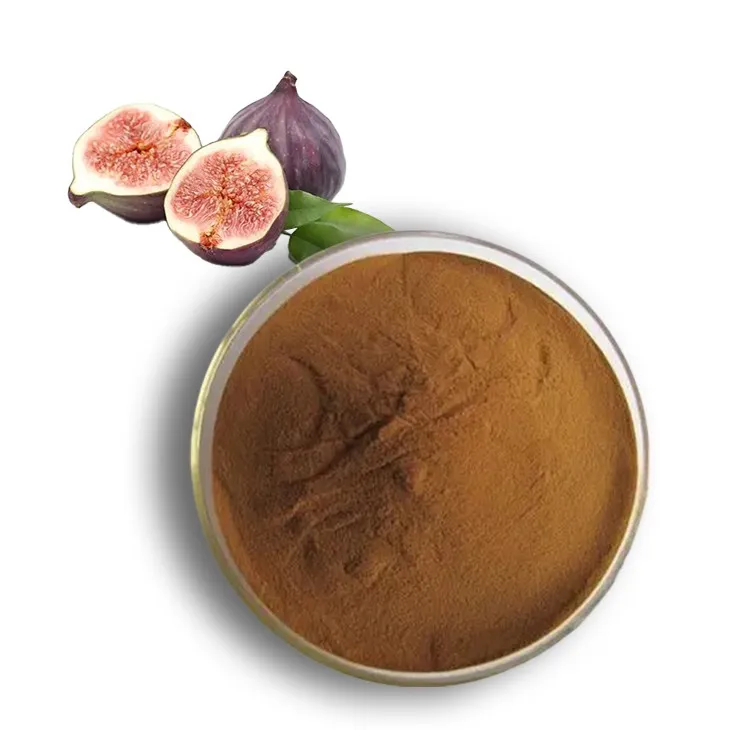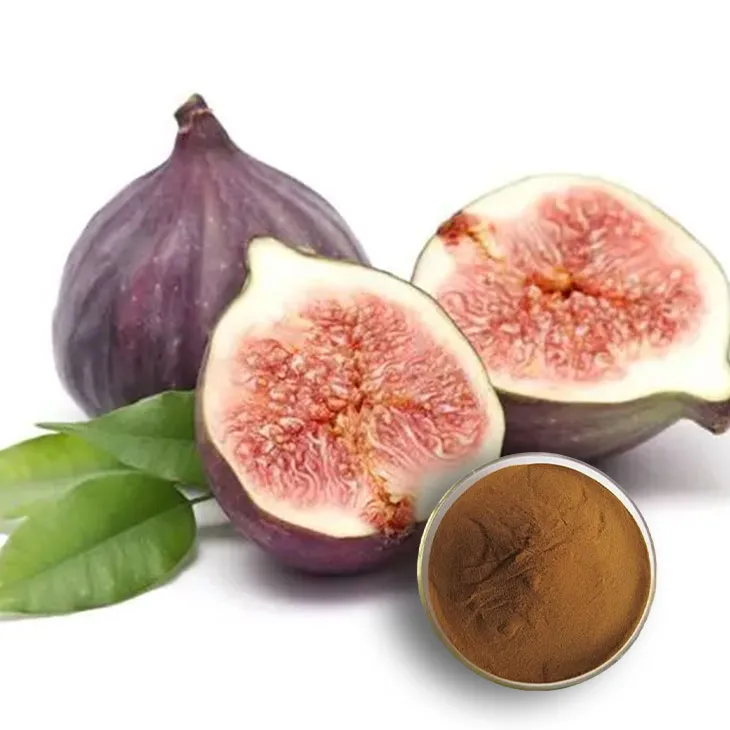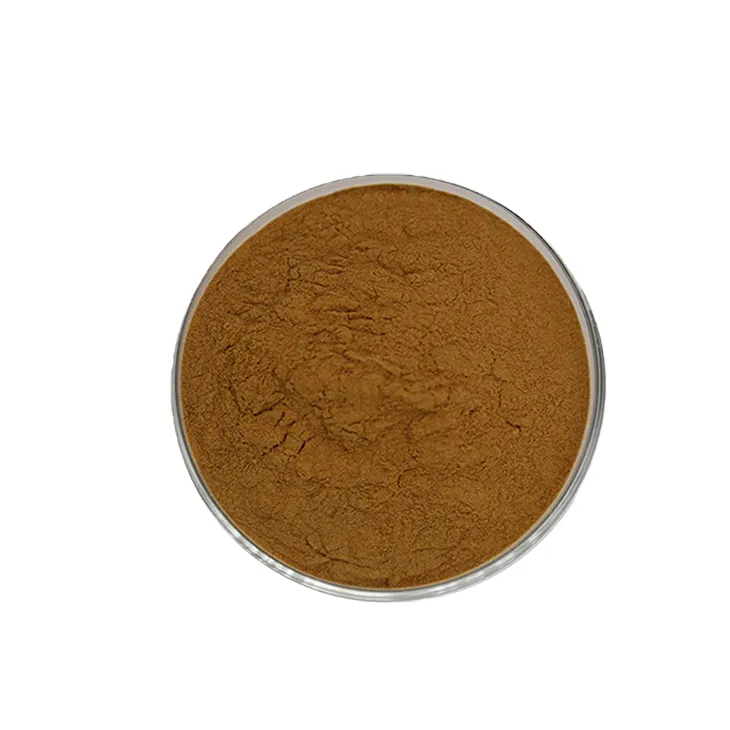- 0086-571-85302990
- sales@greenskybio.com
Nutritional Goldmine: Unveiling the Benefits of Fig Extract
2024-07-04

Introduction
Figs have been a part of human diet and traditional medicine for centuries. Fig Extract, which is derived from this wonderful fruit, is a nutritional goldmine that is now gaining more and more attention in the modern world of health and wellness. It is rich in a wide variety of nutrients, bioactive compounds, and antioxidants that offer numerous benefits for the human body.

Rich in Vitamins and Minerals
Vitamins
Fig Extract contains several important vitamins. One of the most notable is vitamin K. Vitamin K plays a crucial role in blood clotting, which is essential for preventing excessive bleeding. It also contributes to bone health by helping in the activation of proteins involved in bone mineralization. Additionally, Fig Extract also contains vitamin A, which is important for maintaining healthy vision, skin, and the immune system. Vitamin C, another antioxidant vitamin present in fig extract, helps in collagen synthesis, boosts the immune system, and protects the body against oxidative stress.
Minerals
When it comes to minerals, fig extract is a great source. Potassium is one of the key minerals found in it. Adequate potassium intake is essential for maintaining proper heart function, regulating blood pressure, and ensuring normal muscle and nerve function. Fig extract also contains calcium, which is vital for strong bones and teeth. Magnesium, another mineral present in fig extract, is involved in over 300 enzymatic reactions in the body, including those related to energy production, muscle function, and DNA synthesis.
Powerful Antioxidant Properties
Fig extract is rich in antioxidants. Antioxidants are substances that can prevent or slow damage to cells caused by free radicals. Free radicals are unstable molecules that are produced in the body as a result of normal metabolism, but can also be generated by external factors such as pollution, smoking, and exposure to radiation.
Polyphenols
One of the main types of antioxidants in fig extract is polyphenols. These polyphenols include flavonoids and phenolic acids. Flavonoids, such as Quercetin and kaempferol, have been shown to have anti - inflammatory, anti - cancer, and cardioprotective properties. Phenolic acids, on the other hand, can help in reducing oxidative stress and protecting the body against chronic diseases.
Carotenoids
Fig extract also contains carotenoids, such as beta - carotene. Beta - carotene is a precursor of vitamin A and has antioxidant properties. It can protect the skin from damage caused by ultraviolet (UV) radiation and may also play a role in reducing the risk of certain cancers.
Benefits for Heart Health
Blood Pressure Regulation
The potassium content in fig extract can help in regulating blood pressure. High potassium intake is associated with a lower risk of hypertension. By maintaining normal blood pressure levels, fig extract can reduce the risk of heart disease, stroke, and other cardiovascular problems.
Cholesterol Management
Fig extract may also play a role in managing cholesterol levels. Some studies suggest that the bioactive compounds in fig extract can help in reducing LDL (low - density lipoprotein) cholesterol, which is often referred to as "bad" cholesterol. At the same time, it may help in increasing HDL (high - density lipoprotein) cholesterol, which is considered "good" cholesterol. This balance in cholesterol levels is beneficial for heart health.
Anti - Inflammatory Effects
The anti - inflammatory properties of fig extract, due to its antioxidant content, can also be beneficial for the heart. Chronic inflammation in the body is associated with an increased risk of heart disease. By reducing inflammation, fig extract can help in protecting the heart and blood vessels.Improving Skin Complexion
Moisturizing and Hydrating
Fig extract can be used in skin care products due to its moisturizing and hydrating properties. It helps in retaining moisture in the skin, which can make the skin look more supple and smooth. This is especially beneficial for people with dry skin.
Anti - Aging Effects
The antioxidants in fig extract can also fight against the signs of aging. Free radicals can damage the skin cells and lead to wrinkles, fine lines, and loss of elasticity. By neutralizing these free radicals, fig extract can help in reducing the appearance of these signs of aging and give the skin a more youthful look.
Treating Skin Disorders
In traditional medicine, fig extract has been used to treat various skin disorders. It may have anti - fungal and anti - bacterial properties that can be useful in treating skin infections. It can also help in soothing irritated skin and reducing redness.Digestive Health Benefits
Fiber Content
Fig extract contains dietary fiber, which is important for digestive health. Fiber can add bulk to the stool, promoting regular bowel movements and preventing constipation. It can also help in reducing the risk of developing hemorrhoids and diverticular disease.
Prebiotic Properties
Some components of fig extract may act as prebiotics. Prebiotics are substances that can promote the growth of beneficial gut bacteria. A healthy gut microbiota is associated with improved digestion, better nutrient absorption, and a stronger immune system.
Relieving Digestive Discomfort
Fig extract has been used traditionally to relieve digestive discomfort such as bloating and indigestion. It may work by relaxing the muscles in the digestive tract or by reducing inflammation in the gut.Immune - Boosting Effects
Vitamins and Minerals for Immunity
The vitamins and minerals present in fig extract, such as vitamin C and zinc, play important roles in the immune system. Vitamin C can stimulate the production of white blood cells, which are the body's defense against infections. Zinc is involved in many aspects of the immune response, including the function of immune cells.
Antioxidants and Immunity
The antioxidants in fig extract can also boost the immune system. By reducing oxidative stress in the body, antioxidants can help in maintaining the normal function of immune cells and enhance the body's ability to fight against infections.Conclusion
Fig extract is truly a nutritional goldmine with a wide range of benefits. From promoting heart health and improving skin complexion to enhancing digestive and immune functions, it has a lot to offer. Incorporating fig extract into one's diet or using products containing fig extract can be a great way to take advantage of these benefits and lead a healthier lifestyle. However, it is important to note that more research is still needed to fully understand all the potential benefits and mechanisms of action of fig extract. In the meantime, it can be a valuable addition to our efforts towards better health and overall vitality.
FAQ:
What are the main vitamins in fig extract?
Fig extract contains vitamins such as vitamin A, vitamin C, and several B - vitamins. Vitamin A is important for vision and immune function. Vitamin C is a powerful antioxidant that helps in collagen synthesis and boosts the immune system. B - vitamins play crucial roles in energy metabolism and maintaining a healthy nervous system.
How does fig extract promote heart health?
Fig extract may promote heart health in several ways. It contains potassium which helps in regulating blood pressure. Additionally, the bioactive compounds in fig extract might have anti - inflammatory properties that can reduce the risk of heart diseases by decreasing inflammation in the blood vessels.
Can fig extract really improve skin complexion?
Yes, it can. The vitamins and antioxidants present in fig extract contribute to skin health. Vitamin C aids in collagen production which keeps the skin firm and smooth. Antioxidants in fig extract help in fighting free radicals that can damage the skin cells, resulting in an improved skin complexion.
What are the bioactive compounds in fig extract?
Some of the bioactive compounds in fig extract include phenolic compounds, flavonoids, and tannins. Phenolic compounds have antioxidant and anti - inflammatory properties. Flavonoids are known for their various health - promoting effects, such as reducing the risk of chronic diseases. Tannins can also have antioxidant and antibacterial activities.
How can fig extract be incorporated into a daily diet?
Fig extract can be added to smoothies, yogurt, or oatmeal for a nutritional boost. It can also be used in baking, for example, in muffins or cakes. Another option is to mix it with salad dressings to add a unique flavor and extra nutrients.
Related literature
- The Nutritional Composition and Health Benefits of Figs"
- "Bioactive Compounds in Fig Extract: A Review of Their Potential Health Effects"
- "Fig Extract: A Promising Ingredient for Heart - Health and Skin - Care"
- ▶ Hesperidin
- ▶ Citrus Bioflavonoids
- ▶ Plant Extract
- ▶ lycopene
- ▶ Diosmin
- ▶ Grape seed extract
- ▶ Sea buckthorn Juice Powder
- ▶ Fruit Juice Powder
- ▶ Hops Extract
- ▶ Artichoke Extract
- ▶ Mushroom extract
- ▶ Astaxanthin
- ▶ Green Tea Extract
- ▶ Curcumin
- ▶ Horse Chestnut Extract
- ▶ Other Product
- ▶ Boswellia Serrata Extract
- ▶ Resveratrol
- ▶ Marigold Extract
- ▶ Grape Leaf Extract
- ▶ New Product
- ▶ Aminolevulinic acid
- ▶ Cranberry Extract
- ▶ Red Yeast Rice
- ▶ Red Wine Extract
-
Natural grape seed extract
2024-07-04
-
Golden Seal Extract
2024-07-04
-
Pueraria Lobata Extract
2024-07-04
-
Mulberry leaf Extract
2024-07-04
-
Selenium yeast
2024-07-04
-
Shikone Extract
2024-07-04
-
Nettle Root Extract
2024-07-04
-
Citrus Aurantii Extract
2024-07-04
-
Cranberry Extract
2024-07-04
-
Feverfew Extract
2024-07-04





















